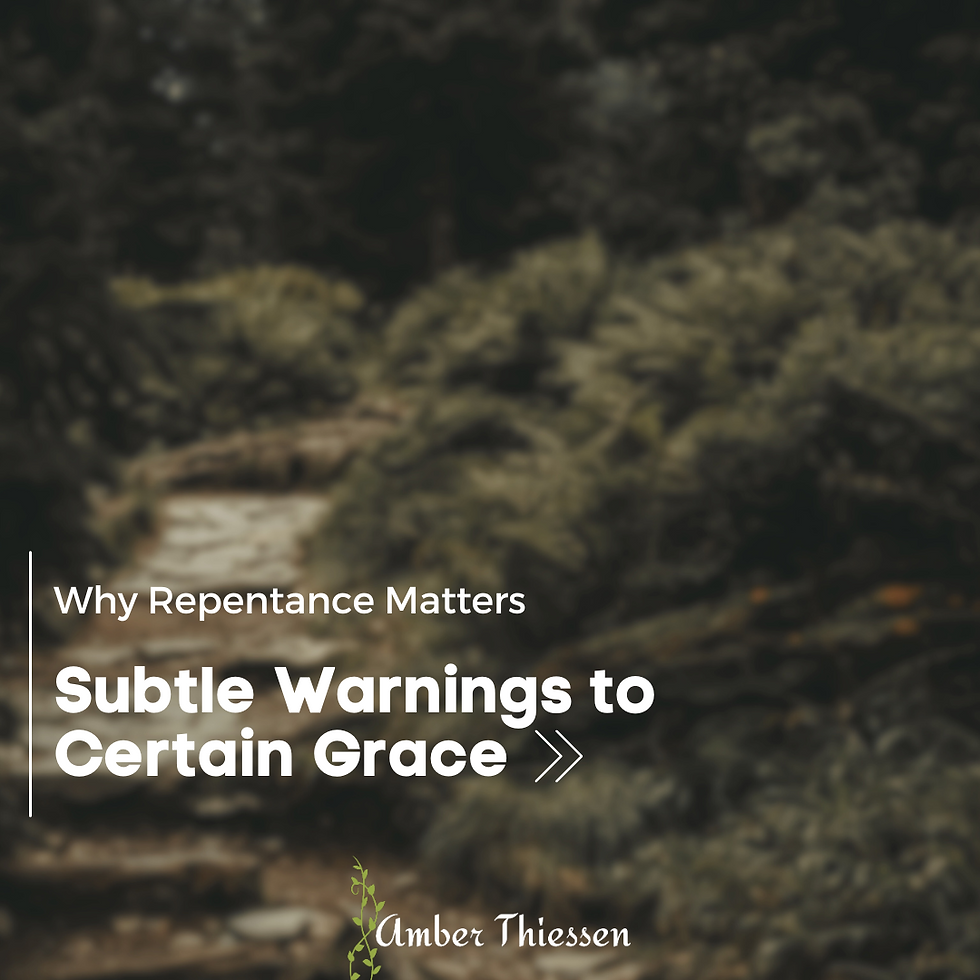Mosaic (Aug 22)
- Amber Thiessen

- Aug 22, 2025
- 4 min read

On Turning the Page
Last week I wrote about King Asa of Judah, a leader who sought the Lord even in times of peace. He built rhythms of devotion and reliance on God so that when war came, his foundation was firm and his trust unshaken. In the glimpses of Asa’s life in 2 Chronicles 14–15, we find inspiration and encouragement.
But then we turn the page.
In chapter 16 we encounter a sobering shift. Asa once again faces war—this time against the northern kingdom of Israel. Instead of turning to God, he turns to politics. Asa takes the silver and gold from the temple and palace treasuries and pays off the king of Syria to break their alliance with Israel and side with Judah instead. On the surface, it looked like a shrewd, strategic move—exactly what a responsible king might do to protect his people.
Yet the prophet Hanani confronts Asa. He reminds the king of God’s past faithfulness, how earlier in his reign Asa had leaned fully on the Lord and found Him sufficient. But now, instead of trusting God, Asa trusted in human strength and political maneuvering.
The glaring problem was that Asa hadn’t leaned on God.
Hanani tells him, “the eyes of the Lord run to and fro throughout the whole earth, to give strong support to those whose heart is blameless toward him. You have done foolishly in this…” (2 Chr. 16:9).
To be told we’ve acted foolishly hits like a sucker punch. If you’ve ever been confronted about sin, you know the sting. But maybe the more revealing question is—how do we respond?
Blame? Anger? Sadness? Humiliation? Shock?
Asa’s response is recorded for us:
“Then Asa was angry with the seer and put him in the stocks in prison, for he was in a rage with him because of this. And Asa inflicted cruelties upon some of the people at the same time.” (2 Chr. 16:10)
If there was any doubt about Asa’s heart, this seals it. Rather than repentance, he reacts with rage—lashing out at the prophet and even oppressing his own people. The one who once walked tenderly with God now allows hardness of sin to take root where surrender once lived.
And if we’re honest, we’ve felt the same temptation. When our sin is exposed, anger can flare, feeding on itself and creating its own destructive cycle. But there is another way: instead of letting anger burn, we can humble ourselves before the Lord. Confrontation, when met with prayer, becomes the doorway to restoration.
“Search me, O God, and know my heart! Try me and know my thoughts! And see if there be any grievous way in me, and lead me in the way everlasting!” (Ps. 139:23–24).
For Asa, we don’t read of any softening of heart. Instead, Scripture tells us of a severe disease in his feet—“yet even in his disease he did not seek the Lord” (2 Chr. 16:12). What began as pride hardened into full resistance, spreading like a wildfire that refused to be extinguished.
From wholehearted devotion to unyielding pride, Asa’s years did not produce maturity or deeper faithfulness, but left behind the rubble of a collapsed spiritual life.
His story sounds a sober warning for us. As the years pass, we must remain watchful in our walk with Christ. The letters to the churches in Revelation remind us that love can grow cold, zeal can turn lukewarm, and fear or false teaching can draw us away from the truth.
We can never assume the years will somehow, almost magically, produce holiness and faithfulness in us. Time alone will not sanctify. Yet, wonderfully and miraculously, by God’s grace—and through the means of grace He provides—He will complete the good work He began in us.
May the warning of Asa’s life invite us to perseverance as we turn the pages of our own unfolding story, leading us into deeper watchfulness and abiding in Christ.
Where do you notice a temptation to lean on your own strength rather than seeking the Lord—and how might you invite Him into that place today?
On the Blog
In Articles
Churches, Don't Dismiss 'Brain Rot' | Brett McCracken
"Brain rot' was Oxford's word of the year in 2024. It seems more and more we're aware of the problem, but less and less insightful with what to do about it. Brett encourages us, "Don't just tell digital addicts to change; give them examples of what it looks like." He provides some practical ways churches can be involved.
Drowning | Kristin Couch
A near drowning in the oceans shows how fast and silent danger can come. This becomes a warning for us as people drift from church and cry out for help. Our corporate worship and tether. tothe Scriptures keep us anchored to God.
Disciple-Making in a Busy Season | Scott Hubbard
Many of us feel this all-too familiar tension of adding good things to our schedule while not sacrificing our sanity. It's worth his pointing out that discipleship and disciple-making both come with a cost, so that's definitely something we need to reflect on instead of a blanket response of "I'm too busy." But also to assess our priorities, hobbies and things we could change to make room for life-on-life discipleship.
Finding Wisdom is Better Than Anything | Peter Krol
Proverbs 3 reminds us that wisdom is more valuable than anything else we could desire—yet how often do our lives reflect that truth? This article invites us to pause and consider what it really means to treasure wisdom above all.
Why Did Jacob Wrestle with God? | Iain Duguid
Ever have questions about difficult passages? This article popped up in my feed and I was reminded that blessing comes from clinging to Christ, not by any of my own effort.
In Book Deals
Hey friends, couldn't resist the pull to include some book deals this week. While I do read a lot, I've not been through every book, but they come recommended from other faithful reading friends or are authors I've read before and trust. Enjoy!















Comments